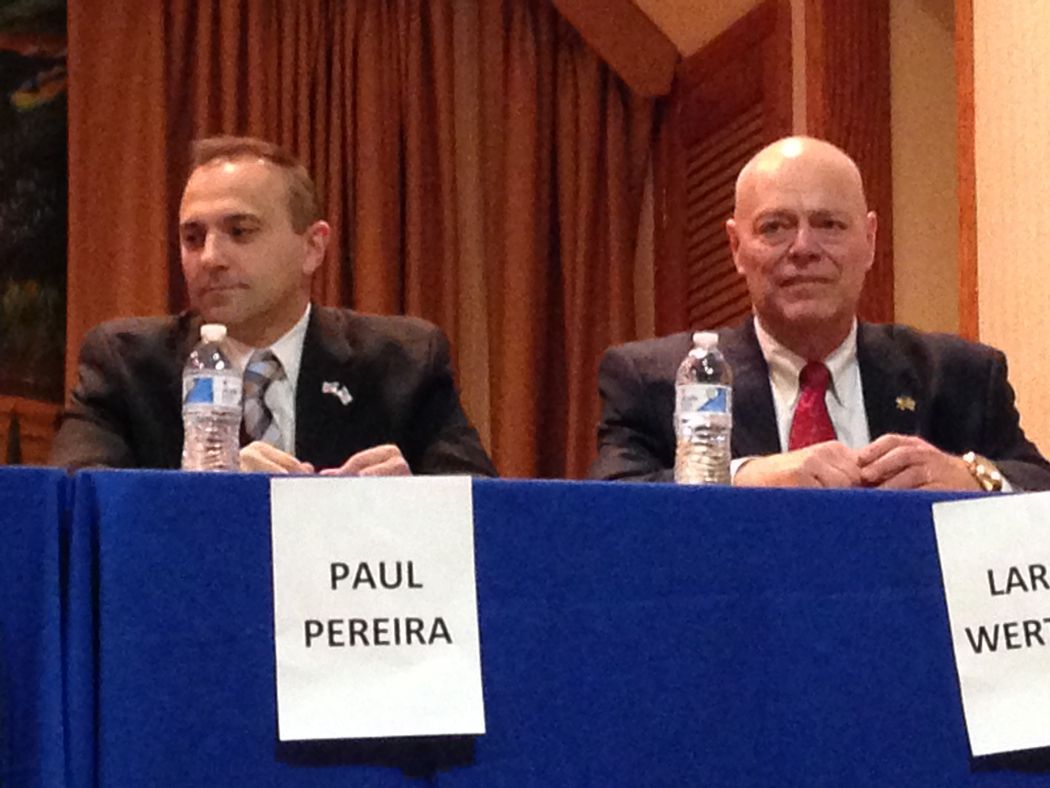Mineola’s four Village Board candidates agreed on several issues in a debate Monday night, but the question of whether residential development has helped or hurt the village continued to be a major point of contention.
As they have in recent weeks, John Colbert and Larry Werther, both former trustees and mayors, argued residential development has added a burden with little benefit, particularly when it comes to tax payments.
While developers get tax breaks, they said, young homeowners and seniors have gotten minimal tax relief.
“It sounds like we have an obligation to people who live outside the village,” said Werther, running on the My Home Party line. “The people who sit on the board have one obligation, and that’s to the folks who currently live (in) the village, not future residents.”
Incumbent Trustee Paul Cusato and Deputy Mayor Paul Pereira continued to defend the projects the village has approved.
Sometimes echoing Mayor Scott Strauss’ public statement two weeks ago, they said development has brought Mineola millions of dollars in new revenue and greatly strengthened the village’s financial footing.
The Village Board has used that money to pay for important capital projects up front, they said, while keeping taxes flat or imposing slight increases.
“I will spend all night educating you on the facts so you don’t scare people into believing something they don’t know,” said Pereira, the New Line Party candidate.
With only one of four projects occupied and a second nearing completion, Colbert said the Village Board has underestimated the impact developments will have on traffic, parking and village water and sewer services.
The Save Our Suburb Party candidate again called for a time-specific moratorium on high-rise apartment applications until the village thoroughly studies those impacts.
Pereira said the board has studied all those factors, and is going to see how all four developments “pan out” before considering more.
He and Cusato characterized December’s change to the village code removing the board’s obligation to hear development applications as a moratorium.
“We are not going to hear any applications of these types of buildings for the foreseeable future. End of story,” Pereira said.
Werther argued the Village Board didn’t listen to residents when it approved the Village Green project at 199 Second St. dozens said they opposed it at public hearings.
The former deputy mayor who sat on the Village Board from 2003 to 2013 spoke most critically of the Village Green in particular, calling it a “LeFrak City apartment building” and saying it would “create a nightmare” in the area, especially for parking.
“I promise, if elected to this board, I will listen to everything that you have to say,” Werther said in his closing statement.
Both he and Colbert criticized the developments’ payment-in-lieu-of-taxes, or PILOT, agreements with the Nassau County Industrial Development Agency that were approved by the Village Board.
With the property-tax breaks, they said, the village and the Mineola school district don’t get the same revenue as they would if developers were paying full property taxes, while residential taxes have still increased despite an apparent windfall for the village.
“A lot of money’s coming into this village, and we shouldn’t have to pay one iota of more tax,” Colbert said.
Twelve-year trustee and Hometown Party candidate Cusato, the quietest during Monday’s debate, said the past two tax increases have been less than 1 percent, with the most recent hike set at 0.16 percent.
He and Pereira, an eight-year trustee, said trustees have listened to residents and responded to concerns about development and other issues.
When residents complained about the condition of sidewalks and curbs, Cusato said, “We listened to you and we took care of that.”
“We have to make the tough decisions, and I stand by every decision that I’ve made on the board, because I’m doing not only for me and for you, but for my children and your children and for the future of this village,” Pereira said.
In conversation with residents, Pereira said, most have said they think the village is headed in the right direction.
Colbert, though, said residents have asked why so much development is concentrated in Mineola.
In response, Pereira said Mineola is uniquely situated for “transit-oriented development,” which has spurred new business in the downtown area.
If voters decide development has been wrong for the village on election day, he said, the board will listen.
All four candidates agreed developers’ development incentive bonus payments are a boon to the village, as they help fund capital projects, such as the recent upgrades to Memorial Park, without any extra expense to taxpayers.
“I have to give them warm fuzzies for that,” Colbert said.
Colbert said he wished he had those assets during his mayoral administration from 1994 to 2003, which saw $25 million in capital projects and left the village with $33 million in debt.
Pereira credited Colbert for building facilities Mineola desperately needed then, such as a new library, pool and Village Hall.
But with development incentive bonuses, he said, the village has undertaken similar projects and created capital reserve funds without borrowing.
If Colbert’s administration had the bonuses, Pereira said, “then I wouldn’t be kicking his butt about $33 million for the next 10 years.”
Colbert defended his borrowing, saying he did what was necessary without increasing the burden on taxpayers.
“I did not spend money recklessly,” he said. “I spent it all for you.”
The candidates also agreed Mineola should continue taking measures to improve public safety, continue preserving village history and provide opportunities for young people to get involved with village government.
The top two vote-winners among the four candidates will win two open trustee seats when voters go to the polls March 15.



